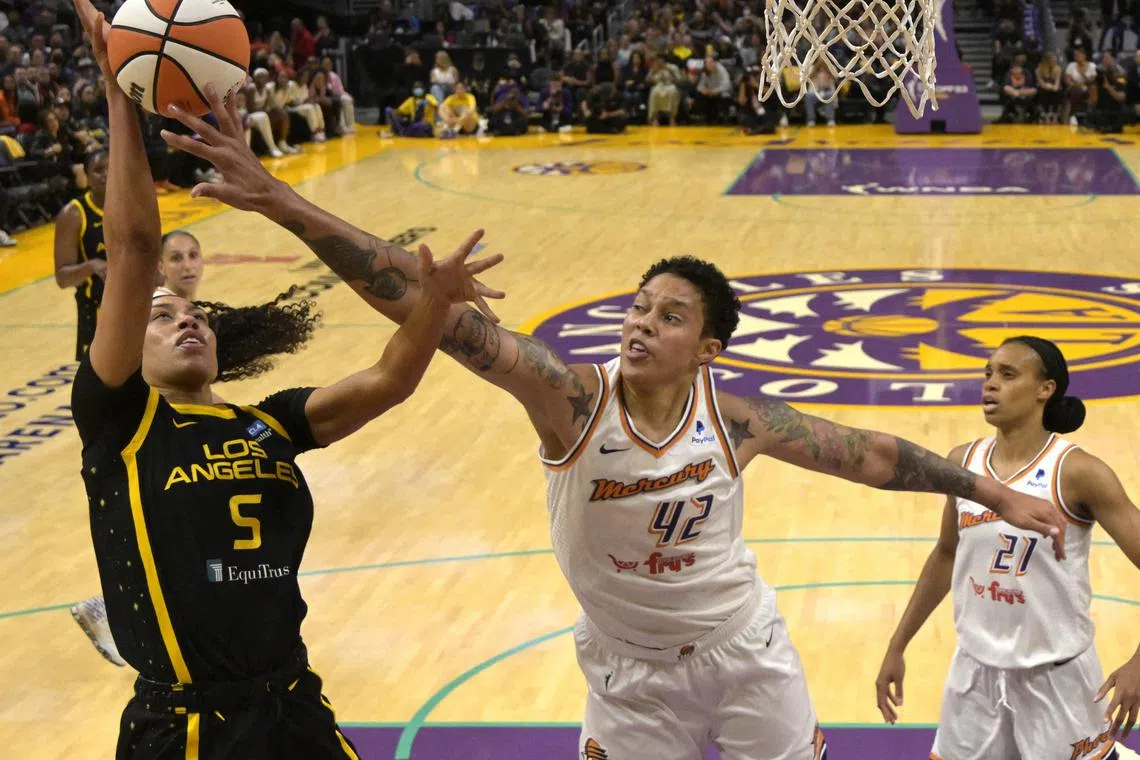Brittney Griner is creating a new normal, for herself and the WNBA
Sign up now: Get ST's newsletters delivered to your inbox

Phoenix Mercury's Brittney Griner (centre) blocks a shot by Los Angeles Sparks guard Dearica Hamby at Crypto.com Arena.
PHOTO: REUTERS
Follow topic:
PHOENIX – Brittney Griner embarked on a four-day itinerary that would disrupt anyone’s circadian rhythm.
First came the White House Correspondents’ Association Dinner in Washington, where she was decked out in a sharp, black suit that Saturday night.
Soon she was rushing to catch a flight, landing in Phoenix at 4am for the start of the Women’s National Basketball Association training camp with the Mercury.
Then she hustled back east, to New York, for her first Met Gala. She wore a sleek tan suit, and her wife, Cherelle, was in a strapless white gown. They mingled with A-list celebrities that night, but Griner needed to be back in Phoenix by Tuesday afternoon for more basketball and, she had hoped, a nap.
The sparkling events, time-zone hopping and overall spectacle were overwhelming but perhaps also came as a kind of relief for Griner, who spent nearly 10 months detained in Russia returned to the United States in December
Ensnared in a geopolitical showdown between Washington and Moscow, she drew attention not only to herself and to the plight of other foreign detainees but also to the financial disparities facing women in sports that had brought her to Russia in the first place.
On Friday, Griner returned to the court for her first official WNBA game
The league is not the same now, in part because of Griner. The issues her detention spotlighted are not new and are unlikely to be easily resolved. But she has galvanised a potent fanbase and sports workforce who are both eager to welcome her home and use this moment to promote change alongside her.
“We have wanted change for a long time, but now we’re really starting to demand it,” Minnesota Lynx forward Napheesa Collier said. “(It’s) an issue where we don’t have the money yet, but pushing so that really, really soon we do have the resources to be treated like the athletes we are.”
Russian customs officials detained Griner at an airport near Moscow in February 2022 after finding vape cartridges with hashish oil in her luggage as she returned to play for UMMC Ekaterinburg, a professional team that reportedly paid her at least US$1 million (S$1.35 million).
She was convicted on drug charges and sentenced to nine years in a penal colony, but she was freed in a prisoner swop for Viktor Bout, a Russian arms dealer, in December.
The WNBA, now in its 27th season, has long watched dozens of its players go overseas each off-season in search of higher pay, though the league has been trying to offer them additional ways to make money domestically.
The maximum salary in the WNBA is about US$230,000, and was half as much just a few years ago. Top players such as Griner can command hundreds of thousands more from international teams. Many people were not aware of this dynamic until her detention and expressed shock on social media and on television shows.
“As much as I would love to, you know, pay my light bill for the love of the game, I can’t,” Griner said in April, during her first news conference since she was freed.
WNBA officials have attributed players’ modest salaries to its historically modest – and perhaps meagre – revenue and media attention. At her conference, Griner pleaded with the unusual swell of reporters to come and cover games during the season, too.
One positive, though, was that the league had raised US$75 million from investors in 2022 that is planned for marketing and revamping the league’s business model.
There was also the issue of travel. Unlike in the NBA, WNBA players fly commercial airlines to games. It has long been a sore point for players, who have had to sleep in airports or rush to games because of delays.
“Would definitely like to make all those flights private,” Griner said.
“That would be nice. Not just for me and my team, but for the whole league. We all deserve it. We work so hard.” NYTIMES

